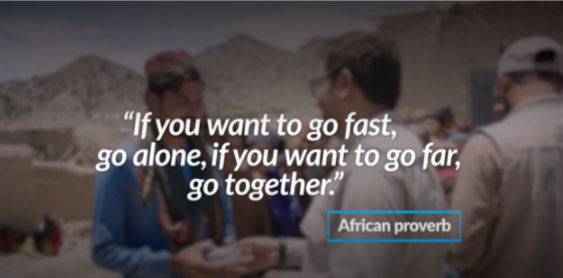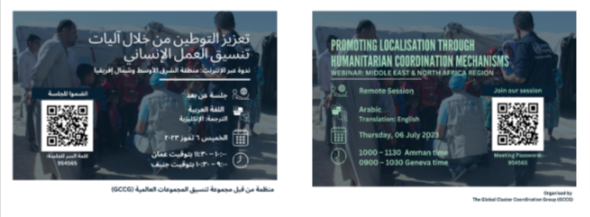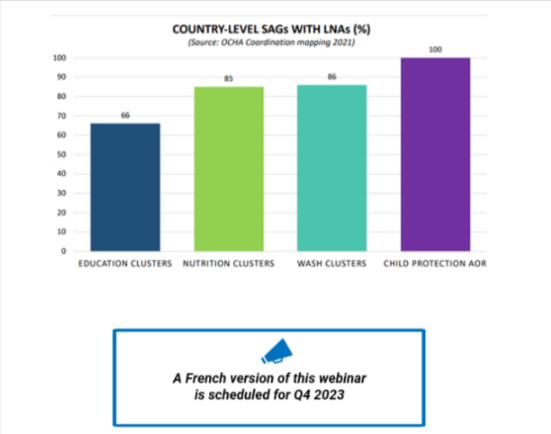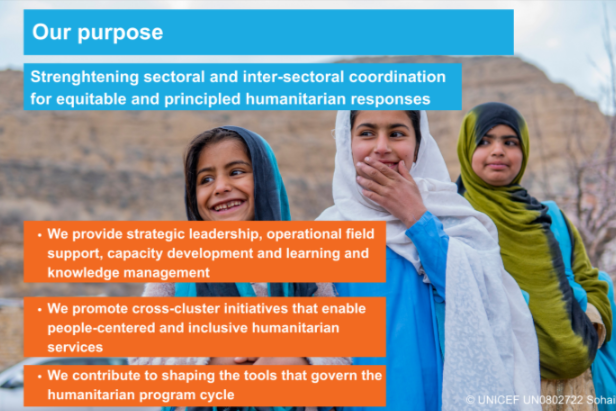Welcome back to the GCCS quarterly newsletter. This edition comes full of updates we hope are of your interest!
We would like to start by thanking the UNICEF senior leaders who have shared their reflections on the important role that UNICEF plays in coordination in humanitarian action in the To Go Far video. In this newsletter, you could also learn about UNICEF-led clusters’/AoR collaboration on localisation and on strengthening education and child protection needs assessments and preparedness. Do not miss an interesting interview with the Nutrition Cluster Coordinator in Ethiopia and other news that we hope you will enjoy.
Good reading!
The GCCS Team
NEWS ON COORDINATION
To Go Far- Cluster Coordination
In every sector of UNICEF’s humanitarian action, the first commitment is to establish and lead the coordination of the response. The Humanitarian Review challenges us to “raising the profile of cluster leadership through greater in-country investment”. In this video, some of UNICEF’s senior leaders reflect on why UNICEF’s cluster leadership role is so crucial in humanitarian action and in achieving results for children.
Watch this inspiring short video in the link below.
Watch the video

CLARE II: Realising UNICEF's Cluster Lead Role for a Better Tomorrow
In September, world leaders attending the UN General Assembly committed to a new phase of accelerated progress towards the Sustainable Development Goals (SDGs). In fragile contexts, it is only by coming together that we will be able to improve humanitarian responses, build resilience and ensure development gains. Just over one year since the Executive Board endorsement of the management response to the evaluation of the UNICEF role as cluster lead/co-lead agency (CLARE II), it is time to take stock on our progress to offer the partnership and leadership needed for accelerated action towards 2030.
Read the full article
Global Support to Country Humanitarian Needs Overview and Response Plans
Every year starting in July and August, country clusters are fully immersed in needs analysis and response planning as part of the Humanitarian Programme Cycle (HPC). UNICEF-led Global Clusters and Area of Responsibility support their country counterparts with a series of webinars and clinics that range from an orientation to the process, to step by step explanations of calculation of People in Need or how to mainstream cross cutting issues. Visit their websites for more information on support available.
UNICEF country offices are similarly busy preparing their respective Humanitarian Action for Children (HAC) appeal documents. The GCCS also worked hand in hand with EMOPS’s Director’s Office to ensure HAC guidance speaks to how the HAC and HRPs can better align, how to work better with interagency processes and what needs-based humanitarian targeting requires in practice in a cluster context.
INTERCLUSTER INITIATIVES
Middle East & North Africa (MENA) Inter-Cluster Localisation Webinar

In July 2023, the UNICEF led/co-led clusters and Area of Responsibility collaborated with the Global Food Security Cluster and the Gender-Based Violence Area of Responsibility (GBV AoR) to support an inter-agency webinar on localisation for Arabic-speaking contexts in the Middle East and North Africa region. The aim of the session was to share good practices, challenges and lessons on promoting participation, representation, and leadership of Local and National Actors (LNAs) in humanitarian coordination mechanisms, in line with IASC Guidance.
The Yemen GBV AoR shared its experience on co-coordination with the Yemen Women Union, a local women rights organization. Click on the hyperlink to access the webinar report in Arabic and English.
The North-west Syria Education and the Food and Security Livelihood Clusters shared their experiences on promoting participation and leadership of LNAs through their respective Strategic Advisory Groups (SAGs).
This is an approach also embraced by the other UNICEF led/co-led clusters and AoR, as reflected in the graph.

Strengthening Education and Child Protection Needs Assessment and Preparedness
In the face of unprecedented challenges posed by the COVID-19 pandemic, the significance of addressing children's education and protection needs holistically has become more evident than ever. The pandemic has highlighted the urgency of ensuring children's well-being and access to quality education, while also revealing the scarcity of tools and resources to collect and assess comprehensive data for informed and inter-sectoral responses.
With the support fromthe Bureau for Humanitarian Assistance, the Global Education Cluster andGlobal Child Protection Area of Responsibility collaborated to bridge this gap by scaling up and delivering joint education in emergencies (EiE) and child protection (CP) needs assessments as well as reinforcing preparedness capacities.
This work is critical as EiE interventions contribute to protection outcomes by providing access to lifesaving services through schools and learning spaces (school feeding, nutrition, health, mental health, and psychosocial services). The classroom is also an important space to convey life-saving messages, raise awareness and promote behavioral changes while offering a space to identify protection needs and mitigate risks.
To date, four assessments have been conducted (in Niger, Burkina Faso, Myanmar and Northwest Syria), with two more underway in Pakistan and the Central African Republic. The assessments have contributed to reinforcing the evidence base in these countries and informed decision making and response planning in both EiE and CP sectors. Aiming to capture the most robust possible data, a key priority has been to work through partners to reach key informants and focus groups with children. For example, in Pakistan, data collection included feedback from 465 education KIs (47% female respondents) and 465 CP KIs (59% female respondents). In Burkina Faso, more than 37 child focus groups were convened to hear directly from the most affected girls and boys what their needs are. Findings and recommendations were also illustrated to enable feedback to children and communities.
VOICES FROM THE FIELD
Cluster Coordination, a Field Perspective with Ines Lezama (Cluster Coordinator in Ethiopia)
The Global Cluster Coordination Section together with DHR Emergencies has initiated a series of interviews with colleagues in coordination roles to reflect on how we can collectively support and leverage UNICEF’s leading role in humanitarian coordination.
To inaugurate this series, we talked to Ines Lezama to reflect on her experience as a Cluster Coordinator in Ethiopia and on
the added value that experienced colleagues can bring in this function to improve both UNICEF and overall humanitarian
responses. She previously worked as head of the Nutrition section in Democratic Republic of Congo.
Read the full story here
CLUSTERS/AoR IN ACTION
Mobilising Global Support for Acute and Forgotten Crises
Global clusters and Areas of Responsibility play an active role in raising awareness on particular crises, influencing global priorities and mobilising resources through donor and partner briefings as well as participation in global events.
Three months after the outbreak of conflict in Sudan, both the Child Protection Area of Responsibility and the Global Nutrition Cluster organised global calls to update donors and cluster partners on the situation and recommend a way forward. Similarly, in September the Global WASH Cluster organised a call to action for scaled up support and resources to
save lives in Haïti.
A few upcoming events include participation by all Global Clusters in AidEx, the world’s leading humanitarian aid event or the Child Protection Area of Responsibility participation in the Global Protection Forum 2023 - a series of virtual events to advance prevention and proactive protection.
You can learn more about global cluster events by signing up to the global cluster newsletters on their respective websites.
LEARNING
In Practice
While the guidance notes and policy that come out of UNICEF’s Headquarters is informed by field needs and realities, helping field colleagues think through and apply its contents really makes a big difference. GCCS’s colleagues provided direct support on two of the cross-cutting areas of expertise: GBV risk mitigation in Ethiopia and humanitarian
advocacy in Myanmar.
In Ethiopia, gender inequalities have worsened, and gender-based violence has dramatically increased, including intimate partner violence, sexual harassment, coercion, assault, rape, child labour, and early marriages. GCCS’s Gender-Based Violence (GBV) in Emergencies Specialist and the Nutrition and Protection Clusters in Ethiopia have jointly developed a Call to Action for increased prioritisation and resourcing of gender programming and capacities. The Call to Action seeks meaningful participation of local and national organisations (especially women rights and women- and indigenous-led organisations) and a better understanding of the distinct needs of vulnerable populations, such as the elderly, people living with disabilities, and those with diverse SOGIESC.
In Myanmar, the humanitarian situation continues to deteriorate in a complex security context, yet humanitarian assistance and access to affected people remains heavily restricted. GCCS’s Advocacy and Communications Specialist designed a session to help the Myanmar cluster and emergency teams to make their communication and advocacy more effective. The exercise built on a mix of self-paced specialized e-learning, followed by a hands-on applied workshop where notably cluster staff discussed key advocacy strategies and, through a case study, practiced developing an advocacy stakeholder mapping and drafting an advocacy note.
Making Learning Available to Frontline Responders
GCCS and the UNICEF-led Global Clusters and Area of Responsibility work collaboratively to develop a core body of learning for cluster-related knowledge. Six new coordination modules have been added to the offer of 80+ e-learning courses existing on the Humanitarian Learning Channel on Agora. Since its launch in March 2022, the channel has been used by over 8,000 learners (both UNICEF staff and partners) who have completed more than 8,600 e-modules in total.

For additional information on the work of each cluster/area of responsibility please click on the images below.
We would welcome your feedback on our newsletter!
Please share your thoughts with us.
If you encounter any issues while opening links, please contact us
Copyright © Global Cluster Coordination Section, All rights reserved.